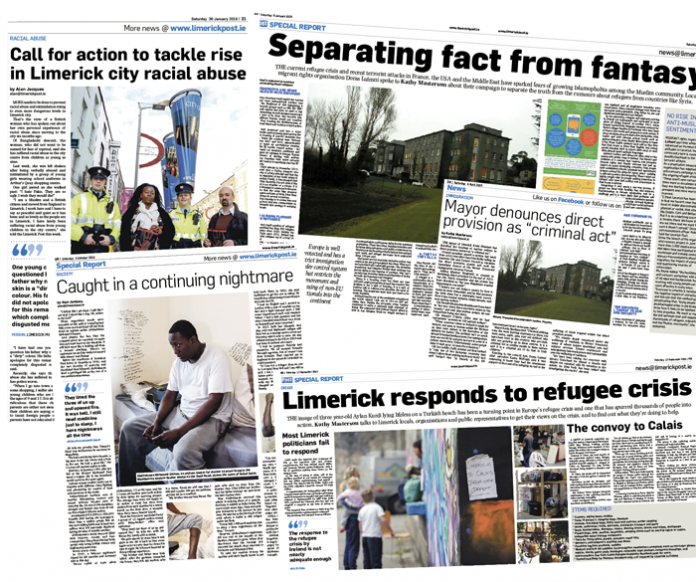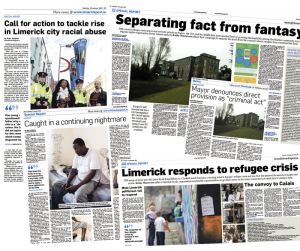
EARLIER this week, The Limerick Post was notified that it was facing the likelihood of a criminal prosecution for incitement to hatred and would also be complained to the Press Council of Ireland for publishing racist and defamatory comments.
There were calls for the editor to resign and a vitriolic digital media campaign included a directive for advertisers to boycott the paper.
The people behind the campaign were Doras Luimní, a non-elected, self-appointed local human rights group whose stated mission is to “promote and uphold the human rights and wellbeing of migrants through personal advocacy, integration development and collaborative advocacy campaigns”.
They maintained that The Limerick Post had no right to publish an article about an immigrant worker at a Direct Provision centre who claimed he was assaulted and intimidated to such an extent that he was forced out of his job.
This was despite the fact that the immigrant worker was interviewed by both the news editor and the journalist who wrote the story on two separate occasions.
Video and documentary evidence was secured proving that the assaults occurred as he stated and were reported to Gardaí at the time. Statements were also secured from asylum seekers in Limerick direct provision centres testifying to incidents of intimidation and expressing concern over increasing radicalisation among recent arrivals to the centres.
Because of the man’s genuine fear of reprisals, the paper agreed to the use of a pseudonym and not to give any indication of what country he immigrated from.
However, Gardaí have confirmed that a summons has already been served on a man suspected as being one of the offenders in the incident that was reported to Askeaton Garda Station last June. They said that this man is to appear at Limerick District Court in connection with the alleged incident at a Direct Provision centre last year.
Despite being told of the paper’s extensive research and its record of promoting racial integration and tolerance, Doras Luimní director Leonie Kerins issued a statement to media outlets and advocacy groups expressing outrage over the fact that the paper published the article.
She focused in particular on the worker’s expression of concern about increased radicalisation among young men in the centre and his claim that staff were subjected to physical attacks and mental abuse by young Muslim men.
She went on to state that Doras Luimní was “deeply concerned by the publication of this article, which is entirely unfounded and absent of fact or evidence” and accused the Limerick Post of publishing it with no “context, fact or thought given to the implications of doing so”.
Doras Luimní then instigated a vicious social media campaign urging its supporters to contact the paper in an effort to get them to retract the article and abide by their version of the immigration narrative.
This quickly escalated into a call for the editor’s resignation and the castigation of the reporter who wrote the story. Most of these demands were made by people whose social media profiles indicated that they are in permanent, pensionable jobs and are never likely to face the prospect of unemployment or consequence for their own professional performance.
Others went down the route of canvassing the paper’s advertisers to boycott the Limerick Post until the article was retracted and Doras Luimní’s demands were met, without any concern for the livelihoods of the 30 people directly employed by the paper and the many more relying on it for their household income.
Of even greater concern was the deliberate targeting of the reporter whose photograph and those of family members were circulated on social media along with the Doras Luimní demands.
With an audited circulation of almost 52,000 copies every week, The Limerick Post is aware of its responsibility to the community it serves.
The paper has a diverse and inclusive editorial policy. Its weekly editorials, or leading articles, are not the work of a single individual but rotated among journalists to give expression to the widest possible range of opinion.
Our journalists have slept on the streets with the homeless, told the stories of the immigrants and socially marginalised and championed many unpopular causes.
We have been vocal critics of the Direct Provision system and the injustice endured by those unfortunate to be part of it.
But we are also aware that the faults exposed in the system have created an environment where radicalisation is a very real danger.
And we are not alone in this view. Leaders of the Muslim community both locally and nationally have expressed similar concerns.
This is not racism. It is reality.
On Tuesday, The Limerick Post issued a statement accusing Doras Luimní of trying to silence the dissenting voice of a vulnerable immigrant worker and stifle the right to free editorial expression.
The response from Doras Luimní was a repeat of its demand for a retraction and to state that they had reported the allegations made in the article to “the authorities”.
by Gerry Collison











